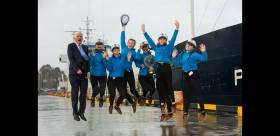Displaying items by tag: SFPC Competition
Shannon Foynes Port Company Invite Transition Students to Enter 'Shooting the Breeze' Short-Film Competition
Shannon Foynes Port Company (SFPC) in collaboration with The Hunt Museum, Limerick would like to invite Transition Year Students in counties lining the Shannon estuary to enter a short film competition.
The students invited from counties, Clare, Limerick and Kerry, can take part in this year’s “Shooting the Breeze” short film competition.
Shooting The Breeze is a short film competition aimed at TY students from these counties which line the 500km2 area of marine activities on the Shannon Estuary, stretching from Kerry to Loop Head to Limerick City with its dock basin port.
The region is where SPFC operate six terminals among them, Foynes Port, mid-way along Ireland’s deepest sheltered commercial harbour and largest bulk-port company.
The theme of the short film competition is ‘Renewable Energy Solutions’ as according to Mick Kennelly, Harbour Master, SFPC, said the film must focus on wind-power on the Shannon Estuary.
SFPC along with The Hunt Museum is also delighted to be working on this collaborative project which is linked to the museum exhibition: Night’s Candles Are Burnt Out: Climate, Culture, Change & Community.
The exhibition which runs until 29 February, 2024, is curated by The Hunt Museum, in collaboration with ESB and ESB Archives, Western Star Floating Wind, SFPC, Shannon Airport Group, and Gkinetic Energy Ltd.ve project.
For further information, check out SFPC’s Competition Trailer, by clicking here to watch.
In addition for information packs and entry application form, contact the port via this email: [email protected] or by tel: 069 73102
Entry forms to be returned by 31 January, 2024
Film clips submitted by 21 March of next year
TOP 5 Best Film will be announced on 8 April.
Following this, a Gala Awards Event is to take place in the apt venue of the Foynes Flying Boat & Maritime Museum on 26 April, 2024.
As for the Competition Prizes!
€2,000 and the Compass Trophy for the winning school
iPad and Commemorative Medal to each member of the winning team
Runner up prizes of a Commemorative Medal and a Sailing Day at Foynes Yacht Club
Generating Energy Using Pressure Pads on Ships Leaves Limerick School on Crest of Wave
#marinescience - One of Ireland’s maritime commercial hubs, Foynes, in Co Limerick was where innovation was in rich supply as schools presented ground-breaking concepts for sustainable energy sources of the future.
The schools congregated at the biennial Shannon Foynes Port Company (SFPC) ‘Compass’ Transition Year Competition that was held last Friday.
Laurel Hill Secondary School was the overall winner which walked away with the honours thanks to their ‘Working Waves’ presentation. This is based on generating energy from ships on the move through a pressure pad system that feeds into an electricity generator and battery in the hull.
But, as judges highlighted, the competition was the most tightly marked, the most competitive and delivered the highest standards in its six-year history.
The Limerick city school, who were presented with their award by Minister of State at the Department of Finance Patrick O’Donovan, was one of five finalists who presented in front of 300 people at the Foynes Flying Boat & Maritime Museum.
They walked away with the top prize of the perpetual trophy, a €2,000 cheque for their school and iPads & COMPASS gold medals for each of the team members. All runners up received a COMPASS silver medal and a sailing day on the Shannon Estuary sponsored by the Foynes Yacht Club Sailing Academy.





























































